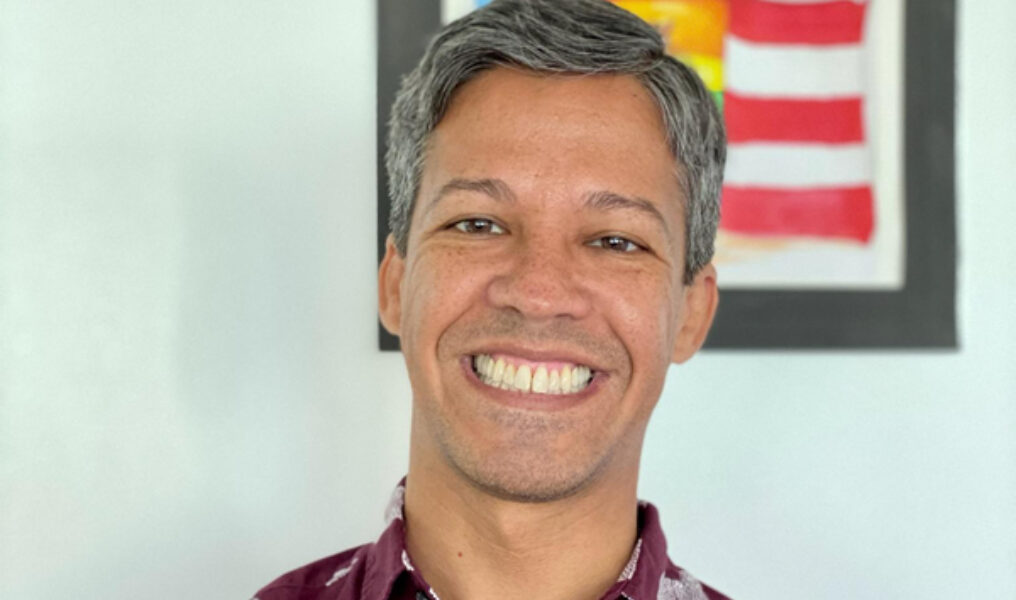An LGBTQ activist in Puerto Rico regained access to his verified and personal Facebook pages on Wednesday after being banned for more than two months.
Pedro Julio Serrano was unable to access his Facebook pages since late August, both platforms comprising of more than 140,000 followers in total. He was alerted he violated community guidelines and "pretending to be a well-known person or public figure."
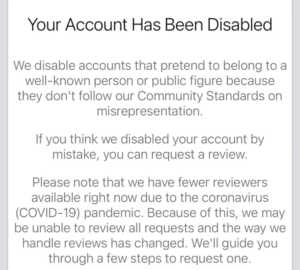
The initial alert Pedro Julio Serrano received that said he was banned from accessing his pages.
Serrano is not aware of violating any guidelines and wasn't pretending to be a public figure. At the time, he was the sole administrator of his pages but added two users on Wednesday to act as administrators in case another ban occurs.
Serrano since August emailed Facebook weekly, directly messaged the platform's accounts on Twitter and Instagram and submitted multiple forms of identification to regain access.
"(My) platform is critical for me to continue to lead a movement in Puerto Rico to make sure that LGBTQ people are treated fairly," he told the Washington Blade.
Facebook is heavily used in Puerto Rico, he said, and Statista reported Facebook accounted for 80 percent of social media site visits on the island thus far in 2020.
In a message sent to Serrano from Facebook, the platform wrote the suspension was a "mistake."
"We rely on automation that detects violations of Community Standards as well as 15,000 human content reviewers, but occasionally content is flagged or removed in error," said a Facebook company spokesperson in an emailed statement when asked why Serrano was unable to access to his account for two months.
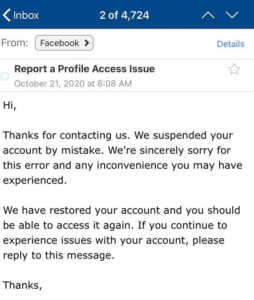
Facebook on Oct. 21, 2020, sent Pedro Julio Serrano a message that said his Facebook pages were once again accessible.
Serrano, a vocal LGBTQ rights advocate who regularly criticizes outgoing Gov. Wanda Vázquez Garced and other members of her pro-statehood New Progressive Party, is unsure what caused this prolonged ban. He's speculative the initial ban on his pages were due to mass reporting by anti-LGBTQ groups and individuals because of his work with San Juan Mayor Carmen Yul√≠n Cruz, who lost in August's gubernatorial primary.
Serrano has also been outspoken on violence against transgender Puerto Ricans.
Six trans Puerto Ricans have been reported killed on the island this year. Five of them were trans women.
Serrano said his advocacy and, in particular, his demands that the government make changes to protect trans people may have factored into him being blocked from his Facebook accounts.
"I know that when you are in a position of leveraging your voice, these things happen because they want to silence you," he said. "But it shouldn't happen. I'm hopeful that it doesn't happen again, and I can continue using this resource that is so vital."
In addition to his work in politics, Serrano is a founder and executive director of Puerto Rico Para Tod@s, a Puerto Rican LGBTQ advocacy organization, and runs clinics in San Juan for trans people and people with HIV.
Serrano said he has never had a problem with Facebook to this magnitude in the past.
Kathleen Ruane, senior legislative counsel with the American Civil Liberties Union, said platforms like Serrano's are integral to marginalized groups that seek to foster community. Ruane said they also assist in spreading messages in ways traditional media outlets cannot in terms of content and reach.
"Social media has been, even in spite of some of the challenges that queer communities and communities of color face, a democratizing force," she said.
C Rivera, a trans activist from Puerto Rico has also experienced bans on their personal page, with six alone this year so far, all with varying time limits.
Rivera also helps lead "Boicot La Comay," a Facebook page with more than 100,000 likes and followers that advocates for the cancellation of "La Comay," a Puerto Rican gossip show that promotes racist, homophobic and misogynist stereotypes.
Vázquez and other members of her party are regular guests on the program that a life-sized puppet hosts. Serrano is among those who called for "La Comay" to be canceled in June after it mocked Ana Irma Rivera Lassén, a lesbian woman of African descent who is running for the Puerto Rico Senate.
Authorities a few weeks after the segment aired arrested Serrano and charged him with two counts of marital sexual assault against his former partner. A judge last month dismissed the charges on grounds there was no probable cause to prosecute him.
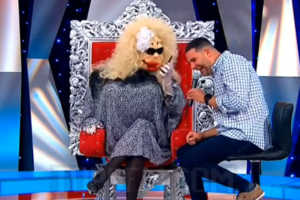
A scene from "La Comay." (Screen capture via YouTube)
Rivera said they experience more censorship because of their identity. They often write back against hate speech directed to them and trans people, which has been the cause of most of the bans. Rivera once posted a screenshot of a transphobic message directed to them and was promptly banned, they said.
"Basically, about four months of the year I'm banned from Facebook for responding to some sort of attack, for being sarcastic," they said. "And then the person that was attacking trans people doesn't get banned, but I get banned."
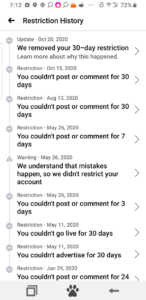
A sample of C Rivera's Facebook ban history.
Ruane said Facebook has disproportionately silenced LGBTQ content for years.
Rivera is also forced to use their legal name and hasn't been able to change it due to policy standards. Ruane said this is another instance of anti-LGBTQ regulations on Facebook's part.
Ruane added Serrano's lack of clarity on why his page was banned is also an issue.
"You can't really contest Facebook's decision if they are not providing clarity as to why they made it in the first place," she said.
Ruane said social media is also a platform for advocacy and community. Limiting this outlet by banning pages and rejecting ads can cause loss of income and even risk lives, she said.
"De-platforming or censoring people from Facebook, or from any platform, may seem like this isn't so much of a big deal, but it could have real-world consequences," she said.
Ruane said Facebook needs to take steps to improve its regulation of content in building transparency when creating guidelines and enforcing them. Conducting meaningful review and having particularity in citing violations is also necessary, she said.
The platform, along with Instagram, said they would ban conversion therapy content on their sites in June, following a block on ads promoting the practice earlier this year.
Facebook recently refused to approve an ad containing a photo of a lesbian couple. The band Unsung Lilly submitted an ad of the duo, including a picture of the pair touching foreheads, to promote their new album and Patreon page in efforts to keep the band afloat financially. Facebook had labeled the video as containing "adult sexually explicit content," according to the band and ACLU.
The ad was repeatedly rejected, and the couple decided to re-submit the ad but replaced the picture of them with a photo of a heterosexual couple. The ad was then approved.
